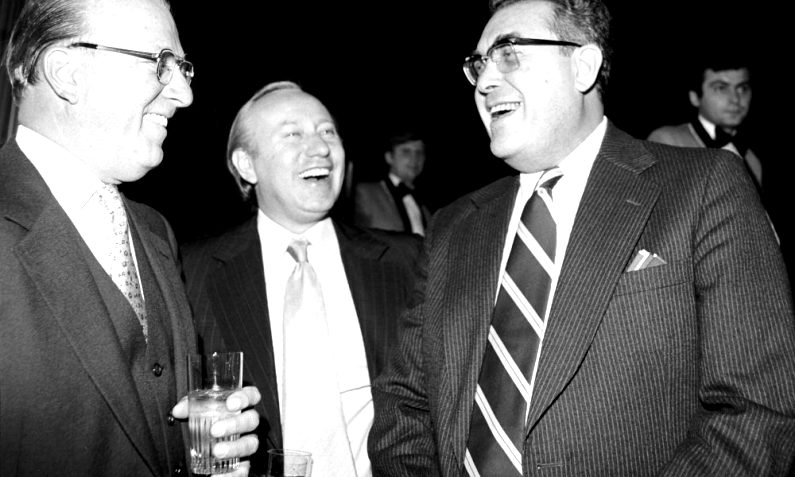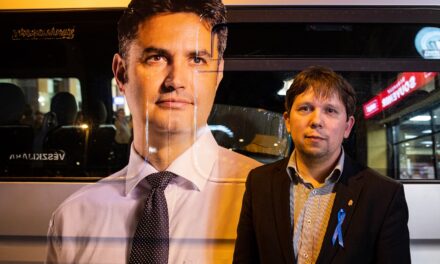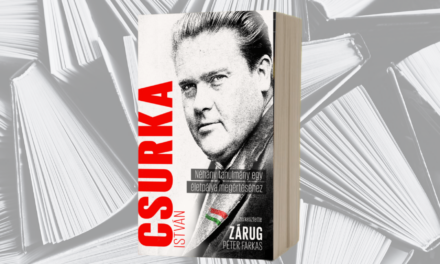Basil Scarlis, the first secretary of the US embassy in Budapest, approached József Tóth, the deputy director of Mineralimpex, in the fall of 1980 with the question of how the war between Iraq and Iran would affect Hungary's oil imports. József Tóth was the deputy and right-hand man of István Russay, a participant and expert in the economic abuses carried out using Mineralimpex and Mineralkontor, and continued it after Russay's retirement.
Money, money, money
The counter-intelligence intercepted Mineralimpex's phones - there was sufficient reason for it, as the company's managers had been monitored for years due to suspicion of serious economic fraud - and they also reacted sensitively to the content of this call. József Tóth evaded the answer, but he discussed a personal meeting with the American diplomat, which caused concern for the state security officers. The record of the meeting has so far not been found among the archival documents, although it is likely that the counterintelligence tried to obtain information about it, since both company managers were under close control and surveillance, and the issue of oil deliveries was one of the most important state interests.
We may wonder why the USA chose Hungary for the role of intermediary. The answer is not as mysterious as we think, since readers of this series may already know that during the Cold War
Hungary specifically focused on re-exports, which were excellent for evading sanctions implemented for political reasons.In addition, a corruption network settled on this activity, which reached the point that, in many cases, our country sold the product intended for transit cheaper than it was bought for. The latter argument may have been quite strong in the decision-making mechanism. Political aspects also strengthened this partnership, since by the 1980s, the most important economic partner of the United States on the eastern side of the Iron Curtain was Hungary - in 1978, the trade agreement between the two countries was also signed.
The reasons for this are also thought-provoking. It was not primarily ideological and political considerations that led the decision-makers of the USA to turn to Hungary, which was previously considered uninteresting, but there were purely financial reasons for the fact that their attention to Poland and Romania was replaced by Hungary.
We had no protection of national interests at all, our unpatriotic party elite served without reservation the power from which they received money.From a political point of view, the idea was reasonable because the countries of the Eastern Bloc, although they were more on the side of Iraq, supported both countries with weapons to a certain extent. The "peace camp" did not break ties with any of the warring parties. Iran itself was in a difficult situation, as its bank accounts kept in the United States were frozen, so it faced serious financial problems. The partners involved in the business thus concluded a mutually beneficial deal, the only loser of which was the Hungarian people. After the Soviets reduced the amount of oil deliveries, they too allowed the vassal state to try to replace the raw material from other sources.
The Philipp Brothers
"Dr. From the mid-1970s, Russay was personally involved in major currency extraction and re-export transactions. "He organized - with permission - the enterprise in the framework of which the $700 million worth of oil bought from Iran during the US-Iran conflict was immediately brokered to the Swiss company of the US company Philipp Brothers," reads the statement of the state security . But who was Philipp Brothers, or Phibro for short, covering?
The company was founded in Hamburg in 1901, but thanks to its extremely rapid growth, it established a subsidiary in London in 1909 and in New York in 1915. The company, which is primarily engaged in trade, mainly distributed minerals and chemicals, and during the Second World War, it was also responsible for securing the country's strategic metal reserves at the request of the American government. In the following decades, it also achieved significant results in the field of oil trade and processing, and by 1988 the largest private oil refinery in the United States was also owned by Phibro. In 1981, just at the time when Phibro entered the Hungarian oil re-export business, the global company merged with another global company, Salomon Brothers.
Phibro was not unknown to Hungarian financiers. His name also appears in the documents of the state security in the early 1970s, when a foreigner named Mátyás Csillag His escape was very delicate, since he served as a man of military intelligence in Milan, at the trade office, that is, he knew state security secrets. Csillag got a job at the Italian subsidiary of the American company, which means that Phibro's European interests had at least one person who knew the domestic economic and secret service interests very well.
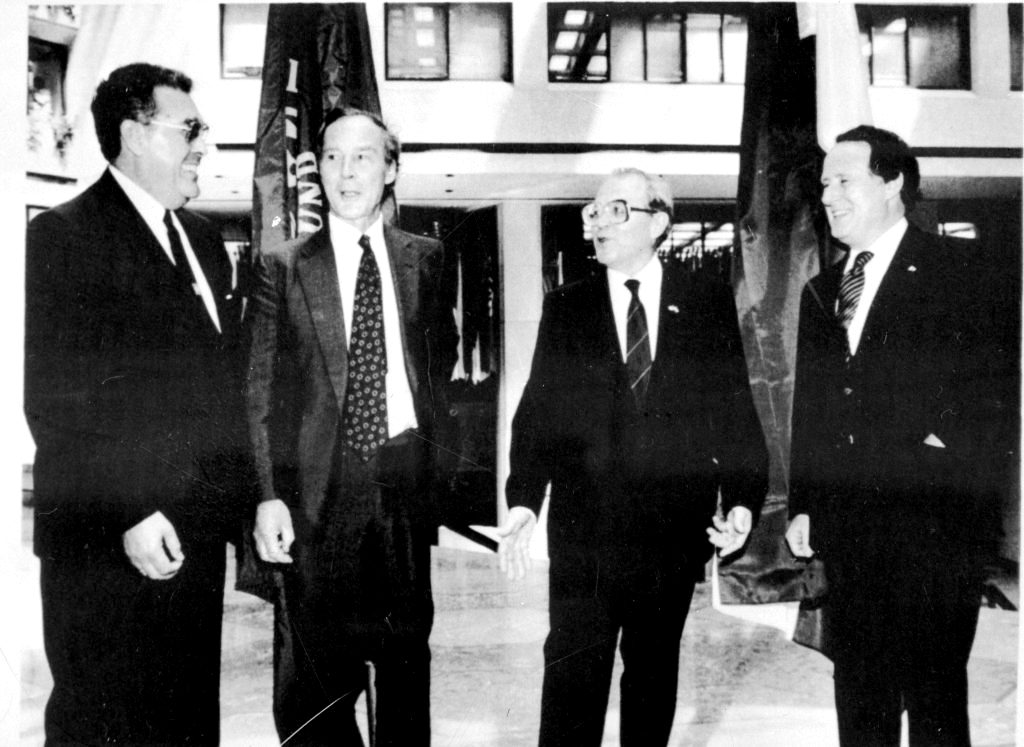
János Fekete, Deputy President of the Hungarian National Bank, LA Whittome, Director of the European Department of the International Monetary Fund, Deputy Prime Minister József Marjai and Jacques de Groote, Managing Director of the International Monetary Fund on May 6, 1982, when Hungary joins the International Monetary Fund . (MTI/UPI/Tim Clary)
Unmissable offer
In 1981, Philipp Brothers became the company through which they organized the shipment of Iranian oil to America. The state security materials available to us do not deal with the aspects of the selection of the company, but it is clear from them that Phibro was willing to pay a significant amount of bribe money to Russay in return for the deal - according to the investigative materials, at least half of the private wealth accumulated by the head of Mineralimpex came from commissions from Phibro together.
Meanwhile, according to MKB and MNB data
due to the extremely unfavorable contract terms, Hungary lost at least ten cents on every dollar in the years-long trade relationship, that is, each shipment represented a loss of at least 10%, which was charged to the account of the state-owned Mineralimpex.The difference arose from the fact that Iran supplied oil to Hungary at OPEC prices, but Mineralimpex sold it to the American company at world market prices, i.e. cheaper.
On the other hand, the commission paid for the deal beneficial to the Americans went to Mineralimpex's Viennese subsidiary, Mineralkontor, and its managers. In the first two or three years, i.e. between 1981 and 1983, despite the significant foreign exchange payments, they were still able to show so many positives in order to maintain the business relationship that Iran bought iron and steel goods from us in return, and Phibro lent the counter value of the contents of the tankers in advance, thus several times also helped the MNB through insolvency.
In 1983, Iran stopped its purchases, but the scheme of re-exporting oil remained unchanged. Between 1981 and 1985, Mineralimpex supplied $6-700 million worth of Iranian oil to Phibro. From 1983, Iran could no longer count on repurchases, and although we know that the country often struggled with liquidity problems in the 1980s, this in itself does not justify maintaining a loss-making business until the end of 1989 due to advance payments.
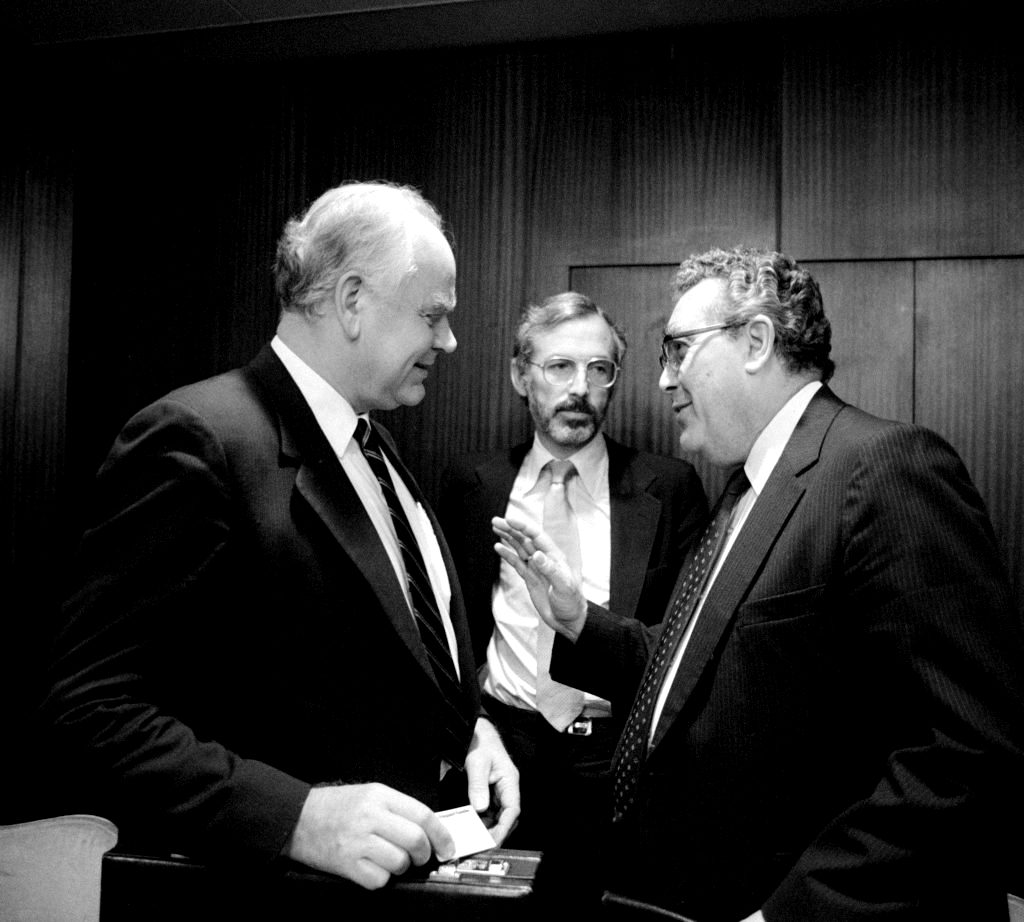
W. Wapenhans (b), Vice President of the World Bank and János Fekete (j), First Vice President of the Hungarian National Bank (MNB), and Alex Gibson, representative of Chemical Bank, after the international press conference of representatives of the Hungarian National Bank and the World Bank, at which the MNB's borrowing of 300 million dollars. MTI Photo: Attila Manek
Wolf laws
An interesting addition to the story is that, of course, there were other applicants for the business that promised immeasurable profits. The former employee of Phibro, Marc Rich, also signed up that he would be happy to take over participation in the oil transit from Phibro, and offered more favorable terms than the arrangement in which the American company bought the oil from us. And why is all this interesting? Because Marc Rich was one of the most wanted fraudsters in the USA, he was wanted for tax evasion and other economic abuses, but the most serious charge against him was that he cheated the Iranian oil embargo and sold Persian oil overseas at a huge profit through his Swiss company. Marc Rich, the billionaire businessman (who even bought 20th Century Fox), the famous art collector, did not become a philanthropist and celebrated genius like his ilk because he spit in the soup of a bigger fish by taking advantage of the business opportunities inherent in the embargo. also wanted to mine.
This "life-and-death struggle" going on in the background also makes you feel how big the stakes could be, that is, the profits that could be pocketed without hesitation. At the beginning of 1985, Marc Rich applied to the Secretariat of International Economic Relations (NGKT) under the Council of Ministers with the proposal that he was willing to provide our country with a loan of 2-300 million dollars in return for access to the Hungarian oil market. The head of the secretariat at that time Ferenc Bartha, the later president of the MNB, who József Marjai , the deputy president of the Council of Ministers. In the beginning of the eighties, István Tömpe also an employee of the secretariat, who reported in his memoirs that the secretariat most often operated manually:
Marjai constantly made his presence felt. The NGKT was a center of power, so it handled and dismissed cases.
He also prevented Mark Rich from getting involved in the Iranian oil deals. The American businessman's recommendation was rejected on the grounds that "for political reasons, we are doing business with another American company, Philipp Brothers, because it has rendered a serious service to our country," we can read in the information collected by the state security. The institution under Marjai's supervision thus protected Phibro's interest in the Iranian oil deals despite the significant loss, even though they knew the details:
The Ministry of the Interior based on the information in its possession
„he gave verbal information for the first time in October 1981 to Comrade József Marjai, Deputy Prime Minister. Between 1982 and 1985, he signaled the relevant party and government bodies in several cases, then in possession of most of the data on economic crimes, in 1985 he wanted to initiate criminal proceedings. against Russay.
Despite this, neither Marjai nor any other member of the party leadership prevented the increasingly significant amount of damage:
In November 1987, in the case code-named "Traitors" [this was the code name of the investigation against the Russays], the operative department presented a summary report, from which an information report was prepared for the government and party leadership on the instructions of Comrade the Minister of the Interior. In it, we indicated the continuation of unprofitable businesses, and at the same time suggested taking the necessary state measures in order to interrupt them. So far, no measures of this kind have been taken in the case, and thus the continuous accumulation of losses continues."
Who did Phibro owe to such a protected position on the domestic oil market?
Source: PestiSrácok
Author: historian Zsuzsanna Borvendég
(On the cover photo: C. Bernard Jacobs (b), president of the American financial institution National City Bank of Minneapolis, Zoltán Juhar, state secretary of the Ministry of Internal Trade, and János Fekete (j), vice president of the Magyar Nemzeti Bank, talk at the reception, which is hosted by the National City Bank of Minneapolis gave this after a press conference held on the occasion of the planned Budapest branch opening at the Hotel Duna Intercontinental on October 4, 1979. MTI Photo: Tamás Fényes

